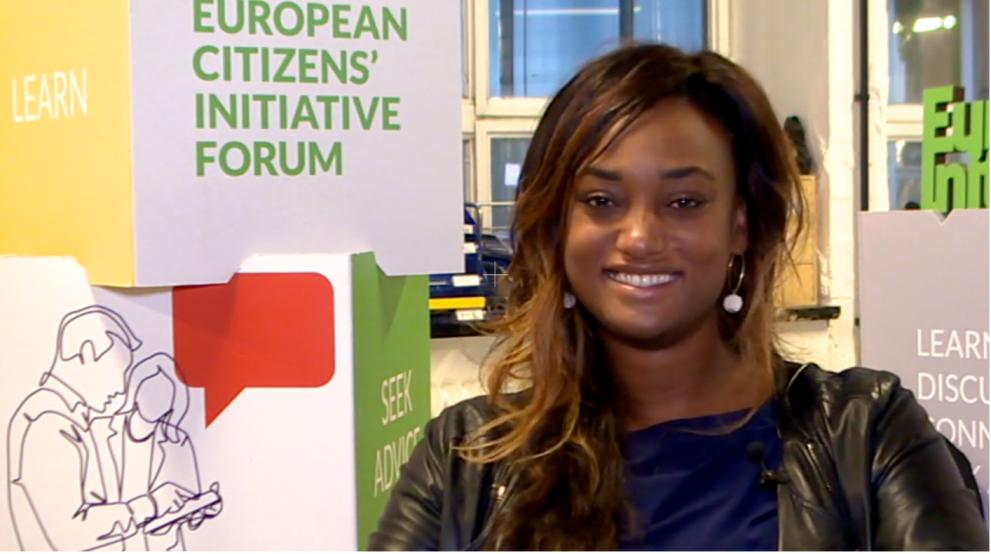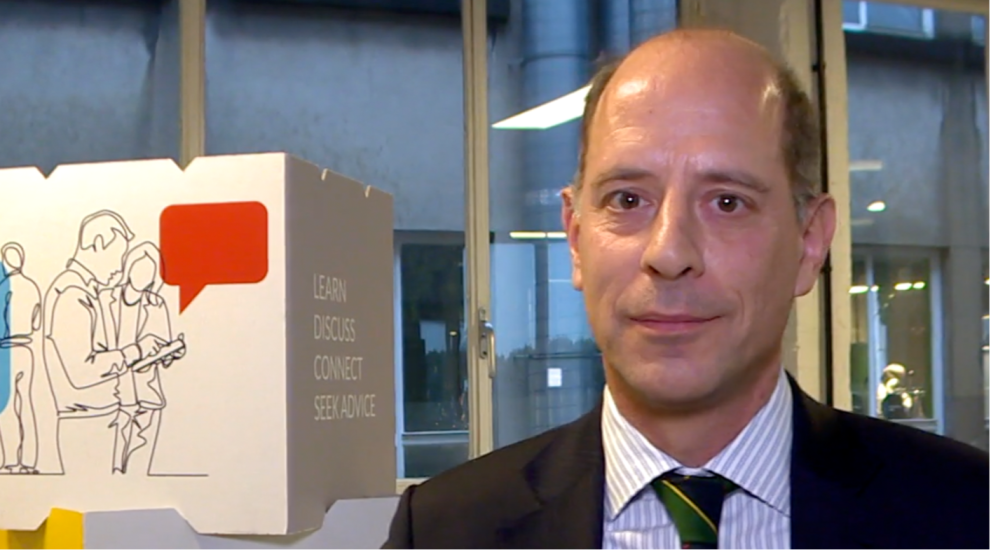Afryea Uiterloo is the representative of the European citizens’ initiative Connecting all European capitals and people through a high-speed train network.
Q: Why do you think this initiative is important for European citizens?
Afryea Uiterloo: Our ultimate goal is to connect all citizens from all European countries because we believe it's important for people to connect and meet each other. If people can meet each other, we are getting into a more tolerant society so that people can understand each other, and it's important that people can move freely. High-speed rail connections can contribute to solving many of the problems we face today in our society. We see increased congestion on the road and in the sky, and we believe that the train is the safest, most environmentally friendly and most accessible transport mode there is.
Q: How did you come up with the idea to use the European Citizens’ Initiative as a tool to achieve this goal?
Afryea Uiterloo: I used to work for the Dutch government organisation ProRail, and since 2020 I have been working as a political adviser in the European Parliament. Learning how the European institutions work and all the instruments that are available, I came across the European Citizens' Initiative. If we want a change, it's the politicians who make decisions, and it's the politicians who prioritise, and it’s also the politicians who decide where the funding will go, so if we want a change, it's important that politicians are on our side. How do you get politicians to move, be ambitious, or share your views? I think that they move if their voters ask them to and if citizens speak up. I think the European Citizens' Initiative is THE instrument to do so because it gives a concrete, practical voice to what voters want. It's a great instrument because if you sign an Initiative, your vote doesn’t go to waste, because if the initiative reaches 1 million signatures, then the European Commission needs to respond. That's different when you compare it to the Dutch petitions. You can reach a certain amount of signatures there, but that does not mean that the government needs to do anything.
-- "I think the European Citizen’s Initiative is a great instrument, a rewarding instrument and a great way to embody the voice of the European citizens." --
The first step to launching an initiative is to register your proposal, and in my experience, it's really important to be precise in the details and to read into the competences of the European Union so that you ask for something that can be executed.
Q: What is your advice for future Initiative organisers?
Afryea Uiterloo: At the start of the process, it's all in the details. Take your time, read everything there is on the Forum, and afterwards, it is quite easy and, the support system is really well organised.
Another thing to take into consideration is that there could be a different time frame between the approval of the proposal and the moment you actually start with your campaign. We took two months to put everything in order – we set up the logo, created posters and communication materials, and we started our signature collection period on 30 May 2023.
Because you need to reach a threshold in different countries of the EU, we reached out to people we know and to people with experience and background in business and asked them to help us because they know what works best in their countries. We have a number of country managers, and they reach out to local organisations, the local media, and us for help or collaboration. That's how we have divided the work. We have regular meetings with the country managers and exchange what we have done, what works and what doesn't work, and we all use the same communication and promotional materials. Our next step will be to get in contact with organisations that share our core objective, such as green associations, and ask them if they can help us and if we can use their networks. That's a direction in which we still have some work to do.
-- "My advice for other European citizens’ initiative organisers is really to have an in-depth look at the available material on the Forum." --
It really helped me to have a look at initiatives that were refused, and the reason why they were refused, and I've learned from that. Reach out to other citizen initiative organisers, perhaps you can learn from each other's experience, but you can also make use of the communication channels they have available.
Explore learning opportunities on the Forum
Rogier Vergouwen is an entrepreneur and Chairman of HSR, High-Speed Rail Nederland. He is the substitute representative of the ECI, Connecting all European capitals and people through a high-speed train network.
Q: What is the business rationale behind your initiative?
Rogier Vergouwen: Some time ago we did an investigation on how we can increase economic growth for the country. One of the things we discovered was that if you improve the infrastructure it will foster economic growth for the country.
-- "If you improve the infrastructure, you can travel much faster, it will attract more businesses to your country and also your country is getting more competitive because the traveling costs of employees and of logistics etc. will decrease." --
If you realise that on a distance from 200 to 800 kilometres, a high-speed rail is the fastest way to travel, then you realise that if you start building this, you can increase economic growth.
If you look for instance at travelling from Amsterdam to Berlin, it's 650 kilometres and the train is currently doing that in six hours, whereas the plane takes about one hour. Everyone who is on a business trip will not even think of taking the train - six hours going there, six hours going back, then you need to have a meeting with a customer - it's impossible in one day, you need to book a hotel overnight etc., and it's getting way too inefficient. If you have a high-speed rail you can do the same distance in two and a half hours. This already proves the case that we can make a difference.
There's one more thing if you look at the economic benefits, and it's competition. If you look at the three countries in Europe that have a good national highspeed rail network, that’s France, Spain and Italy. Because they have end-to-end high speed rail connections, you can use that rail to give certain time slots to different companies. In France, you have three competitors in high-speed rail, in Spain you have four, and, in Italy, you have three. We all understand what is going to happen with the pricing if there's competition. There is no monopoly anymore, and all the companies want to have their trains full, so you could travel for example from Madrid to Alicante for as little as 7 EUR. That is only possible if there is competition.
Another topic is sustainability. The emissions of a high-speed rail are only 6 grams per passenger per kilometre. We are all looking at how we can make a clean planet, and how we can live in a clean environment, and this is really an easy thing to do.
Find out more about the EU's action to reduce greenhouse gas emissions from transport
I think those are a few of the benefits that will come with delivering a highspeed rail. Countries can do this all by themselves, but you cannot make the connection across borders without properly aligning with other countries and I think that's where the European Commission comes in.
Q: What is it that you propose to the Commission to do?
Rogier Vergouwen: What we would like to achieve are two things: the European Commission is connected with all the countries, and it can make a broad strategy on how we are going to connect all the European capitals by high-speed rail, and secondly, they can connect the national policy makers from one country to another country to work on the same project together. The European Commission can make legislation to build high-speed rail between European capitals. I think that that's a really big thing where the European Commission can make a difference, and that's what we are requesting in our European citizen initiative. So, if you back that, sign the initiative and join the effort!
Visit the campaign website to learn more: https://www.connect-capitals-hsr.eu/
Visit the initiative's official page here: https://citizens-initiative.europa.eu/initiatives/details/2023/000004_en



Leave a comment
To be able to add comments, you need to authenticate or register.